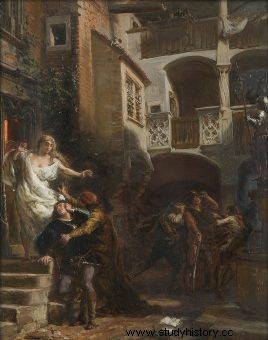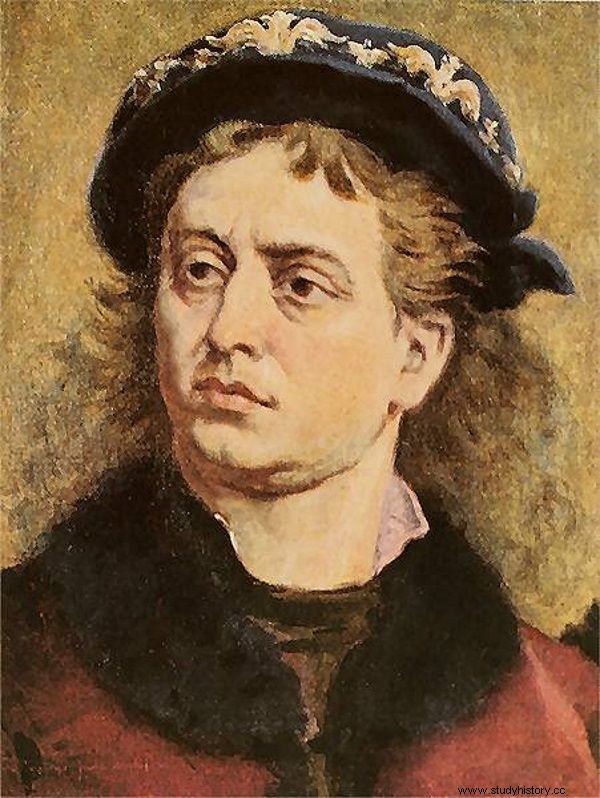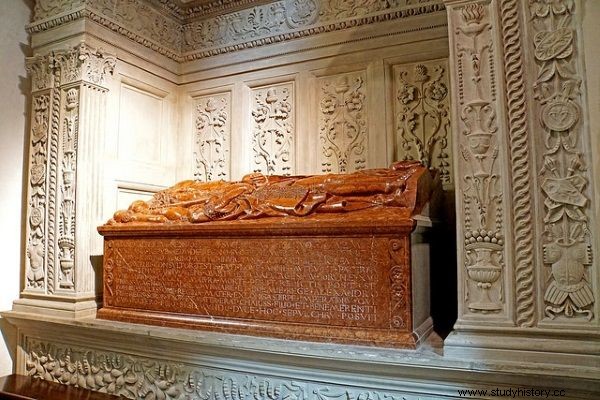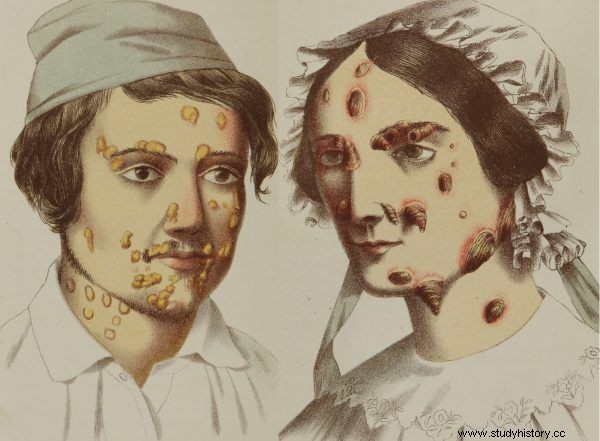He did not regret food, alcohol or carnal pleasures. A sea of women passed through his bedside - no wonder he eventually contracted syphilis from one of them. And yet he was such a nice and obedient boy ... How did it happen that he became the greatest debauchery among Polish rulers?
Who if who, but Elżbieta Rakuszanka could feel fulfilled as a wife. She owed her husband, King Kazimierz Jagiellończyk, not one, but as many as six potential heirs to the throne. She probably also considered herself a good mother. Ultimately, she passed on to the children the most important - in her opinion - qualities:religiousness, mercy, humanitarianism, modesty and respect for moral principles.
Considering the later fate of one of her older sons, Jan Olbracht, who after the death of his father in 1492, sat on the Polish throne, must have made a mistake somewhere . And this is essential, because Jan went down in history as a rather inept, but eminently unbridled ruler who indulged all his whims, not necessarily taking into account the good of the country.
Cold Keep
Before this happened, the young prince, along with a large group of siblings, did not have many opportunities to go crazy. The royal couple's educational methods could even be called Puritan. Kazimierz and his wife cared for their offspring to stay away from actors demoralized by wine, love and lies, and from "dirty poems, singing, whispered music".
The sixteenth-century writer, Stanisław Orzechowski, described the conditions in which the young princes were buried:" Royal prosperity and luxury were not used in their upbringing. but the greatest modesty prevailed in their food, clothes and way of being. ”

Night adventures of Jan Olbracht and Kallimach (photo:public domain)
There comes a time in the life of every child, however, when he has to fly out from under his protective maternal wings. Elizabeth, probably not without regret, handed over her sons to the canon of Krakow, Jan Długosz. Although he was not particularly favorable to King Kazimierz, he undertook the historical mission of raising his descendants. Perhaps was hoping that properly directed youngsters would eventually "turn out to be human" .
Historical reports show that Długosz had a heavy hand and did not avoid hitting his charges. He had the royal consent to do so. Kazimierz was an ardent supporter of corporal punishment. Apparently he even used to say:"You have no nicer music for me than the crying of my children under the teachers' rod."
School of life… in Italian
“Długosz achieved some success with the educational methods he used. He managed to instill in the young princes chivalry and moral ideals, a sense of honor, modesty and religiosity, "comments Karolina Stojek-Sawicka, a historian associated with the University of Wrocław, in his latest book" Plagi Królewskie ".
However, the real school of life Olbracht passed thanks to his second teacher , to the Italian humanist Filipp Buonaccorsi, known as Kallimach. It was he who convinced John that life must be fully enjoyed, and that whims are there to make amends. Especially when you have the means and resources to do so.
There was no need to tell the prince this twice. After all, he was almost a certain heir to the Polish throne:his older brother Władysław became the king of Bohemia and Hungary, and theoretically, Kazimierz, second in line, died prematurely. As the heir, he could therefore allow himself a bit of madness from time to time.

Jan Olbracht (photo:public domain)
The problem is that Olbracht indulged at every step after taking power. The nobility who almost unanimously chose him as king (partly bribed by the prospect of extending their privileges) probably did not think how different from their father the new monarch would turn out to be. And what kind of order he will introduce in his court. This is how the author of "Royal Plagues" describes it:
Women, alcohol, food ... The king liked to pamper his palate, and his table was literally full of nothing . There were cattle, game, poultry, fish, beer, wine, honey, rice, almonds, and figs ...
During the loud games in Wawel's chambers, Olbracht was always accompanied by a crowd of women. It was with them that the young king spent the most time. He was in no hurry to marry, even though he was already over thirty when he came to the throne.
Have a nice bad start
We didn't have to wait long for the effects of our boisterous lifestyle. Sexual escapades and consumed far too much alcohol seriously damaged Jan's health. It got to the point where he did not go anywhere without a group of doctors, with the court physician Jan Liberhant at the forefront.
The ruler managed somehow, but only for a while. The famous expedition to Moldavia in 1497, during which - as it was said - "all the nobility died out", became the nail in his coffin. Overwhelmed by defeat, aware of the loss of authority in the eyes of his subjects, the king lost faith in himself. "All the ideals in which he grew up and grew up fell to ruin, his entire historical mission was buried," the king's biographer, Frederick Papée summed up this moment. Lost dreams of the slayer of the infidels Jan decided to drown in alcohol .
Although Olbracht did not shy away from alcohol earlier - to put it mildly - during this period he completely lost control. Karolina Stojek-Sawicka even accuses him of alcoholism. "The great emotions associated with exaggerated ambitions and exaggerated hopes, so severely disappointed during the expedition, had to find an outlet in alcohol," he writes.

Loafing was one of the vices that drove Olbracht to the grave. The photo shows the tombstone of the ruler at Wawel (photo:Dennis Jarvis, license CC BY-SA 2.0).
Orgy was also a way to relieve stress and react to failures. to which the king began to devote himself with redoubled strength. He did not let any woman pass - it did not matter if she was noble or she was the oldest profession in the world. There was always a place in his retinue for "frivolous virgins".
A syphilitic on the throne
Olbracht's debauchery reached such a scale that even his brother Fryderyk, already a cardinal and archbishop of Gniezno, exhorted him to come to his senses. And yet the clergyman himself had more than one sinful act on his conscience.
Perhaps the rationale behind the monarch's indecent conduct, however, was more than just an overwhelming sense of failure, despondency and the need to "repay" the strict discipline of his childhood . The author of the book "Royal plagues" gives him a gloomy diagnosis:
There were rumors that Jan Olbracht's strange behavior was not so much the result of a mental breakdown that he had to endure after losing the war, but of a disease that had just appeared in Europe - syphilis.

Untreated syphilis was accompanied by the appearance of ulcers from which the secretion was oozing. This is how the disease was presented in the mid-nineteenth century by the authors of the book "A treatise on gonorrhoea and syphilis", Silas Durkee and John S. Parry (source:public domain).
He was allegedly infected by a certain Krakow townswoman, a certain Wąsówna, still in 1497. If he did suffer from this disease, and in its most aggressive form, would explain the skin changes that appeared on Olbracht's face even before the Bukovinian expedition. It would also be easier to understand his sudden (though not unexpected given his health in the last years of his life) death on June 17, 1501.
The methods of treatment that treated the ailing ruler, including hot baths and rubbing with various drugs, and the preserved descriptions of symptoms suggest that the cause of Jan's premature death was precisely syphilis. This disease soon became a real scourge at the royal court .
Editor Andrzej Tokarczyk bitterly summed up Olbracht's rule:"I think it was his happiness that he did not reign any longer, because in those last years of his life he did not behave as befits a monarch". He must be admitted a bit right. Among the candidates for the most debauched ruler of Poland, Jan Olbracht definitely deserved first place. Probably only Augustus II the Strong could compete with him with his army of bastards, although his addiction to sex in comparison to Jagiellon's numerous "weaknesses" seems to be merely a child's play.
Find out what killed the Polish kings:

